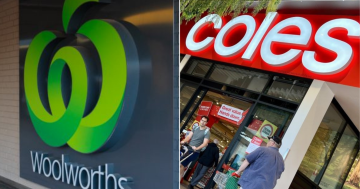
Former Labor minister Craig Emerson has delivered his interim report into the Food and Grocery Code of Conduct. Photo: CBRE.
Supermarkets that abuse their buying power to rip off suppliers and customers should be slapped with massive fines, says the government-appointed reviewer of the food and grocery code of conduct.
Former Labor minister Craig Emerson has delivered his interim report into the big supermarkets and says they cannot be left to govern themselves with a voluntary code of conduct.
He is recommending a mandatory code with accompanying fines of up to 10 per cent of annual revenue for the companies that breach it.
“A heavy imbalance in market power between suppliers and supermarkets in Australia’s heavily concentrated supermarket industry necessitates an enforceable code of conduct,” Dr Emerson says in his report.
“An effective code of conduct would benefit smaller suppliers and consumers by enabling suppliers to innovate and invest in modern equipment to provide better products at lower cost.
“The existing Food and Grocery Code of Conduct is not effective. It contains no penalties for breaches and supermarkets can opt out of important provisions by overriding them in their grocery supply agreements.
“I firmly recommend the code be made mandatory and apply to all supermarkets with annual revenues exceeding $5 billion, which at present are Coles, Woolworths and ALDI, and wholesaler Metcash.
“The code should be strengthened to better protect suppliers, with new protections against retribution, since suppliers’ fear of retribution compromises the code’s effectiveness.
“Effective penalties must apply for breaches of the mandatory code. This would bring the Australian Competition and Consumer Commission (ACCC) into code enforcement.
“It would be able to seek penalties for major or systemic breaches of up to $10 million, 10 per cent of a supermarket’s annual turnover, or three times the benefit it gained from the breach, whichever is the greatest.”
However, Dr Emerson has advised against forcing large supermarkets to sell off stores as a form of punishment for serious code of conduct breaches.
The Nationals and the Greens are both pushing for supermarket divestiture powers to be embedded in a mandatory code.
While the Liberals are also considering embracing the idea, the Federal Government has all but ruled it out.
Prime Minister Anthony Albanese described the divestiture plan as a “Soviet” approach. In his interim report, Dr Emerson says such orders would not be a credible way to boost supermarket competition.
Instead, the ACCC should be able to issue fines of up to $187,800 for minor breaches and take a supermarket to court if it sought to apply maximum penalties.
But that would require suppliers to also engage with the legal process with fear of retribution.
The report recommends mediation as another tool, with the view to paying supplier compensation for breaches.
“In pursuing breaches, the ACCC would need to proceed through the courts. This would usually require a supplier witness who was willing to provide evidence and to stay the course of legal proceedings,” Dr Emerson said.
“Relying on legal proceedings alone would not be an effective approach. In seeking the best of both worlds, a low-cost alternative to court proceedings is therefore also recommended.
“This would involve replicating processes for independent mediation and arbitration that are in other industry codes while also allowing for the complaint-handling provisions of the voluntary code.
“The ‘code arbiters’ engaged by supermarkets would be redesignated ‘code mediators’.
“Suppliers could make complaints to the relevant code mediator. However, if a supplier were not happy with the code mediator, it could request an independent mediator.
“Owing to constitutional limitations, arbitration must be entered into voluntarily to resolve disputes. In a mandatory code, supermarkets will be strongly encouraged to agree to pay compensation, where recommended by the code mediator or determined by an independent arbitrator.
“This compensation could be capped at $5 million, which is a substantial sum for small suppliers.”
The voluntary code was introduced in 2015 to improve standards of business behaviour in the food and grocery sector, but in light of accusations the bigger supermarkets have not been passing on lower farmgate prices to their customers, the government is examining if the code should be toughened.
It appointed Dr Emerson in January to conduct an independent review of the Food and Grocery Code of Conduct. His final report is due in June.
The ACCC is also conducting a review into supermarket price gouging and will report later this year.
Original Article published by Chris Johnson on Riotact.










